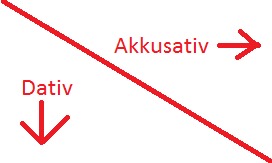
6.1.3 Fusion of the unstresse personal pronouns
The difference between a direct object and an indirect object is very often unclear. That is true as well for people who speak a language that have different personal pronouns for the direct object and the indirect object. German for instance distinguishes in the forrm between a direct object and an indirect object, but that doesn't mean, that all Germans see the difference. (The author of these lines is German, he knows what he is talking about. The difference is taught at school, but very often without any success.) However to understand this difference is crucial, because in opposite to English, where the personal pronoun is the same for the direct object and the indirect object, in most languages these forms are different. We explain the difference here 6.1.1.
We have very often the situation that two pronouns, the direct object and the indirect object collide. In English the use of two following pronouns is not possible. We need a preposition between them.
| I give it to you. |
| He allows it to me. |
In Portuguese we can say "~I give it you" and therefore the problem arises that two pronouns collides. (Or to be more precise: The fact alone that two pronouns collide is not the problem. The problem is, that they are fused to one word.)
Concerning the position in the sentence of these fused pronouns the same rules are valild we have already seen in 6.1.2. The table is a complete list of all possible fusions.
 |
o | as | os | as |
| me | mo | ma | mos | mas |
| te | to | ta | tos | tas |
| lhe | lho | lha | lhos | lhas |
| nos | no-lo | no-la | no-los | no-las |
| vos | vo-lo | vo-la | vo-los | vo-las |
| lhes | lho | lha | lhos | lhas |
mo = it to me / him to me
mos = them to me
ta = she to her
vo-las = them to you (them feminine plural)
lha = she to him / her / you
etc.
This is hard to remember, we always give the same advice. In the part literature of this website are several novels with sound, the original text and the translation. By hearing these novels again and again you will automatically memorise these structure and learn a lot about Brasilian culture. This is much more fun and more effective than trying to learn abstract rules. It is useful to have a passive understanding of the rules in order to understand a sentence if you hear or read it. If you understand the rules passively, you will soon be able to produce them actively.
Concerning the use of these fused pronouns we find comments like that on the internet.
| No português do Brasil, essas combinações não são usadas; até mesmo na língua literária atual, seu emprego é muito raro. | In Brasilian Portuguese these combinations are not used and their use is rare even in literature. |
| Pronome Oblíquo Átono |
|
In English the direct object precedes the indirect object. She gives it to me. => ~ She gives (to) me it. For didactical reasons we translate the other way round. That is not very English, but very Portuguese.
Furthermore there is an alternative if only the indirect object is replaced by a pronoun: 1) She gives me the money. <=> 2) She gives the money to me. 1) Corresponds to the portuguese construction and therefore we put the direct object first.
| Ele dá-me o dinheiro. |
Ele dá-mo. |
| She gives me the money. | She give me it. |
| Eles dá-nos as maçãs. |
Eles dá-nos. |
| The give us the apples. | They give us them. |
| Nos damos-vos os livros. |
Nos damos-vo-los. |
| We give you the books. | We give you them. |
| Do o dinheiro a Manuel. |
Do-lho. |
| I give the money to Manuel. | I give him it. |
| Eu do o carro à senhora. |
Do-lho. |
| I give the car to you. | I give him it.. |
| Não nos quer dar o carro. |
Não no-lo quer dar. |
| He doesn't want to give us the car. | He doesn't want to give it to us. |
| Não vos aconselho fazer isso. |
Não vo-lo aconselho. |
| I recommend you not to do that. | I don't recomment that to you. |
In english both it and that can be subject und direct object.
| subject |
| This is strange. |
| It is strange. |
| direct object |
| I don't eat that. |
| I don't eat it. |
In Portugueses however it = o can't be subject. As a subject only a demonstrative pronoun, see 6.1.6, is possible.
| it / that as the subject of the sentence |
| This is strange. |
| Isso é estranho. |
| This is a catastrophe. |
| Isto é uma catastrofe. |
| That's what make the whole difference for me. |
| Aquilo fez toda a diferença para mim. |
| contact privacy statement imprint |